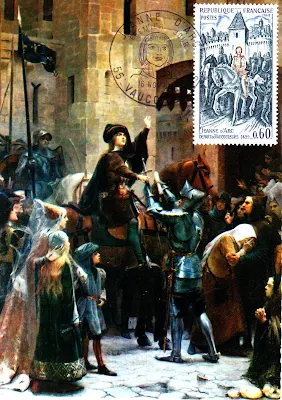LA POSTE FRANCE in 1968 issued a first day cover stamp of Jeanne d'Arc, “The Maid of Orléans” (La Pucelle d’Orléans), departing Vaucouleurs. In 1429, Jeanne d'Arc appealed to Robert De Baudricourt, captain of the royal garrison at Vaucouleurs, to provide an escort to the court of Charles Valois, Dauphin of France. Jeanne d'Arc, believing she was acting under divine guidance, then led the French army in a momentous victory at Orléans in 1429 that repulsed an English attempt to conquer France during the Hundred Years' War.
Jeanne d'Arc is considered a heroine of France for her role during the Lancastrian phase of the Hundred Years’ War, and was canonised as a Roman Catholic saint. Jeanne d'Arc claimed to have received visions of the Archangel Michael, Saint Margaret, and Saint Catherine of Alexandria instructing her to support Charles VII and recover France from English domination late in the Hundred Years’ War. The uncrowned King Charles VII sent Jeanne d'Arc to the siege of Orléans as part of a relief mission. She gained prominence after the siege was lifted only nine days later. Several additional swift victories led to Charles VII’s coronation at Reims. This long-awaited event boosted French morale and paved the way for the final French victory.
On May 23, 1430, she was captured at Compiègne by the Burgundian faction, a group of French nobles allied with the English. She was later handed over to the English and put on trial by the pro-English bishop Pierre Cauchon on a variety of charges. After Cauchon declared her guilty she was burned at the stake on May 30, 1431, dying at about nineteen years of age.
In 1456, an inquisitorial court authorized by Pope Callixtus III examined the trial, debunked the charges against her, pronounced her innocent, and declared her a martyr. In the 16th century she became a symbol of the Catholic League, and in 1803 she was declared a national symbol of France by the decision of Napoleon Bonaparte. She was beatified in 1909 and canonized in 1920. Jeanne d'Arc is one of the nine secondary patron saints of France, along with Saint Denis, Saint Martin of Tours, Saint Louis, Saint Michael, Saint Rémi, Saint Petronilla, Saint Radegund and Saint Thérèse of Lisieux.
Jeanne d'Arc is considered a heroine of France for her role during the Lancastrian phase of the Hundred Years’ War, and was canonised as a Roman Catholic saint. Jeanne d'Arc claimed to have received visions of the Archangel Michael, Saint Margaret, and Saint Catherine of Alexandria instructing her to support Charles VII and recover France from English domination late in the Hundred Years’ War. The uncrowned King Charles VII sent Jeanne d'Arc to the siege of Orléans as part of a relief mission. She gained prominence after the siege was lifted only nine days later. Several additional swift victories led to Charles VII’s coronation at Reims. This long-awaited event boosted French morale and paved the way for the final French victory.
On May 23, 1430, she was captured at Compiègne by the Burgundian faction, a group of French nobles allied with the English. She was later handed over to the English and put on trial by the pro-English bishop Pierre Cauchon on a variety of charges. After Cauchon declared her guilty she was burned at the stake on May 30, 1431, dying at about nineteen years of age.
In 1456, an inquisitorial court authorized by Pope Callixtus III examined the trial, debunked the charges against her, pronounced her innocent, and declared her a martyr. In the 16th century she became a symbol of the Catholic League, and in 1803 she was declared a national symbol of France by the decision of Napoleon Bonaparte. She was beatified in 1909 and canonized in 1920. Jeanne d'Arc is one of the nine secondary patron saints of France, along with Saint Denis, Saint Martin of Tours, Saint Louis, Saint Michael, Saint Rémi, Saint Petronilla, Saint Radegund and Saint Thérèse of Lisieux.

No comments:
Post a Comment